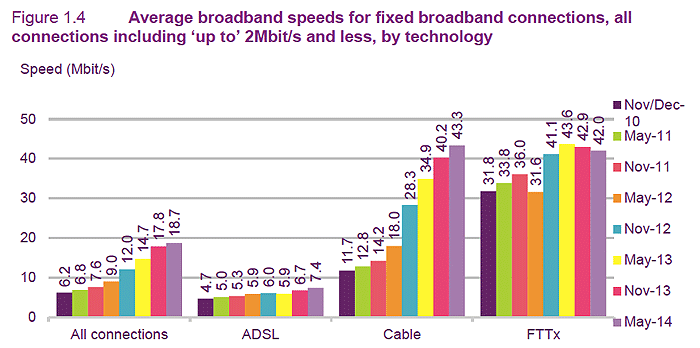Home > Broadband > News > Virgin Media launch large-scale broadband expansion
Virgin Media launch large-scale broadband expansion
VIRGIN Media have begun the biggest expansion to its network since 2007, connecting over 105,000 more homes in London and the North East.

Virgin Media have launched a large-scale expansion of its cable network across the country, as demand for higher internet speeds grows. Over 105,000 homes in London and North East England will soon benefit from Virgin Media's up to 152Mb fibre optic broadband.
The rollout is the largest, single expansion to the network since it was formed in 2007, following the merger with NTL and Telewest. This news will be welcomed by consumers, many of whom have been unable to use Virgin Media's services due to area restrictions.
In August, Virgin Media announced the rollout of its network to 100,000 homes in East London; with superfast broadband reaching properties in Bethnal Green, Isle of Dogs, Newham, West Ham, Stratford, Poplar, Stepney, Bow and East Ham.
Similarly, this month Virgin Media announced that 5,000 more households in North East England will also get connected. Work has already began across Teesside - in Hartlepool, Darlington, Sunderland and Stockton-On-Tees - and is set to be completed by the end of October.
Cable accelerates
In Ofcom's latest broadband speed report [pdf], released at the beginning of October, speed delivered by cable was found to be faster on average than fibre for the first time.
The average speed increase for cable could well be due to Virgin Media's upgrade rollout, which delivered faster speeds, including up to 152Mb, to all existing customers in early 2014.
And with Virgin Media the only cable provider in the UK, that pretty much equates to Virgin outperforming BT's fibre broadband on speed.
The study found that in the six months to May 2014, average speed delivered by cable reached 43.3Mb, overtaking fibre - 42Mb - for the first time.

SOURCE: Ofcom UK fixed-line broadband performance, May 2014
While big developments to improve broadband speed are being implemented, Ed Richards, Ofcom Chief Executive, believes that "there is still work to do in ensuring more widespread distribution of high-speed, reliable broadband services across the UK."
Speed in rural areas
In addition, Ofcom's research confirmed a difference between speed in cities and rural areas, with cities continuing to outpace broadband speed experienced in isolated areas. However, it also discovered narrowing disparities, with rural areas beginning to see improvements.
In the six months to May 2014, average actual download speed in rural areas experienced a 20% increase, while in urban and suburban areas the increase was just 5%. Whereas Ofcom's previous report showed that in the six months to November 2013 average rural speed grew by just 15% and speed in urban and suburban areas grew by 21% and 22% respectively.
Not coincidentally, broadband providers, particularly BT and smaller independents, have been focusing on improving internet access in rural areas.
Virgin Media have also begun trialling a 1Gb rural broadband rollout for the first time. Allowing 100 households in the village of Papworth, Cambridgeshire to sign up.
The trial will allow Virgin Media to test a new method that could potentially reduce the cost of any network rollout by 33%. The new method, which is called narrow-trenching, takes just half the time to complete installations.
The Government is too focusing on improving broadband speed in rural areas adding another £250 million in February to the £1.7 billion state-backed scheme. Broadband Delivery UK, largely being led by BT, is set to connect rural areas around the country to superfast broadband.
Get insider tips and the latest offers in our newsletter

We are independent of all of the products and services we compare.

We order our comparison tables by price or feature and never by referral revenue.

We donate at least 5% of our profits to charity, and we aim to be climate positive.
Get insider tips and the latest offers in our newsletter






Comments (1)